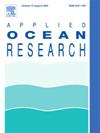Two-dimensional numerical modelling of a novel heaving wave energy converter-perforated breakwater integrated system
IF 4.3
2区 工程技术
Q1 ENGINEERING, OCEAN
引用次数: 0
Abstract
Through numerical modelling, the hydrodynamic performance of a novel wave energy converter-breakwater integrated system, consisting of a perforated breakwater and a heaving wave energy converter (HWEC) in the wave absorption chamber, is investigated. A method for modelling the Coulomb damping force (CDF) provided by the power take-off system is established to address the instability problem caused by the sudden change of the CDF when the motion direction of the HWEC changes. Under the representative wave condition ( = 1.76, where is wave number and is water depth), the working mechanism of the integrated system is clarified, the preferable HWEC hull shape is found, and the nondimensional relationships for determining the geometric parameters are obtained. In addition, by performing the simulation with the waves of = 2.52 and = 1.11, the limits of the geometric parameters are proposed. It is found that the asymmetric HWEC having a seaward straight corner and leeward curved corner is preferable to minimize wave reflection and capture appreciable wave energy. Under the tested condition, when the nondimensional PTO damping force ranges from 0.5 to 1.25 and the response amplitude operator of the HWEC is no less than 0.3, the capture width ratio of the integrated system will mostly exceed 0.3, and the reflected energy will be quite low.
新型波浪能转换器-穿孔防波堤集成系统的二维数值建模
通过数值建模,研究了新型波浪能转换器-防波堤集成系统的水动力性能,该系统由穿孔防波堤和波浪吸收室中的波浪能转换器(HWEC)组成。建立了动力输出系统提供的库仑阻尼力(CDF)建模方法,以解决当 HWEC 的运动方向发生变化时,库仑阻尼力突然变化引起的不稳定问题。在代表性波浪条件下(kd = 1.76,其中 k 为波数,d 为水深),阐明了集成系统的工作机理,找到了理想的 HWEC 船体形状,并获得了确定几何参数的非尺寸关系。此外,通过对 kd = 2.52 和 kd = 1.11 的波浪进行模拟,提出了几何参数的限制。研究发现,具有向海直角和背风弯角的非对称 HWEC 更有利于减少波浪反射和捕获可观的波浪能量。在试验条件下,当无量纲 PTO 阻尼力在 0.5 至 1.25 之间,且 HWEC 的响应振幅算子不小于 0.3 时,集成系统的捕获宽度比大多会超过 0.3,反射能量会相当低。
本文章由计算机程序翻译,如有差异,请以英文原文为准。
求助全文
约1分钟内获得全文
求助全文
来源期刊

Applied Ocean Research
地学-工程:大洋
CiteScore
8.70
自引率
7.00%
发文量
316
审稿时长
59 days
期刊介绍:
The aim of Applied Ocean Research is to encourage the submission of papers that advance the state of knowledge in a range of topics relevant to ocean engineering.
 求助内容:
求助内容: 应助结果提醒方式:
应助结果提醒方式:


